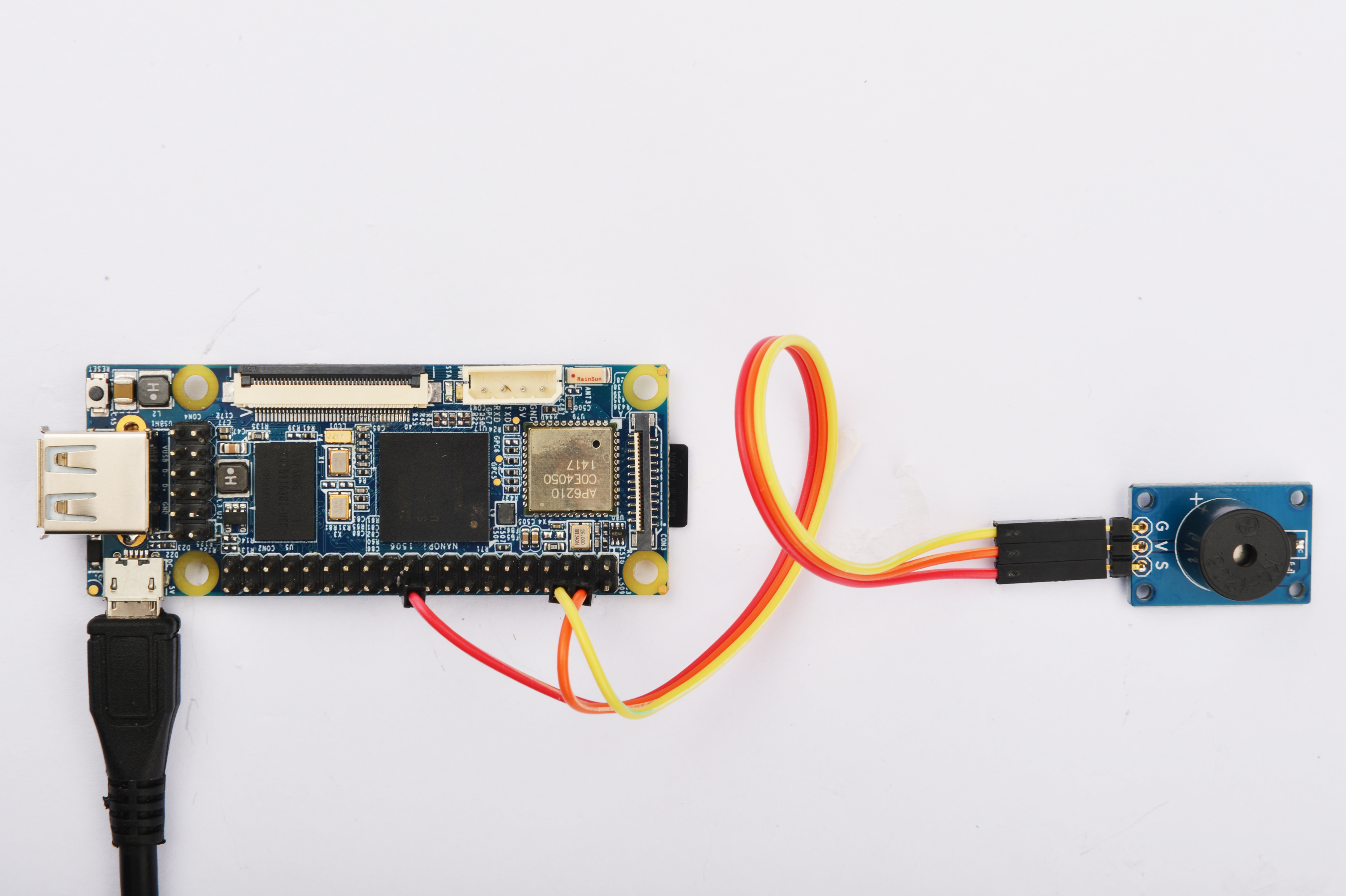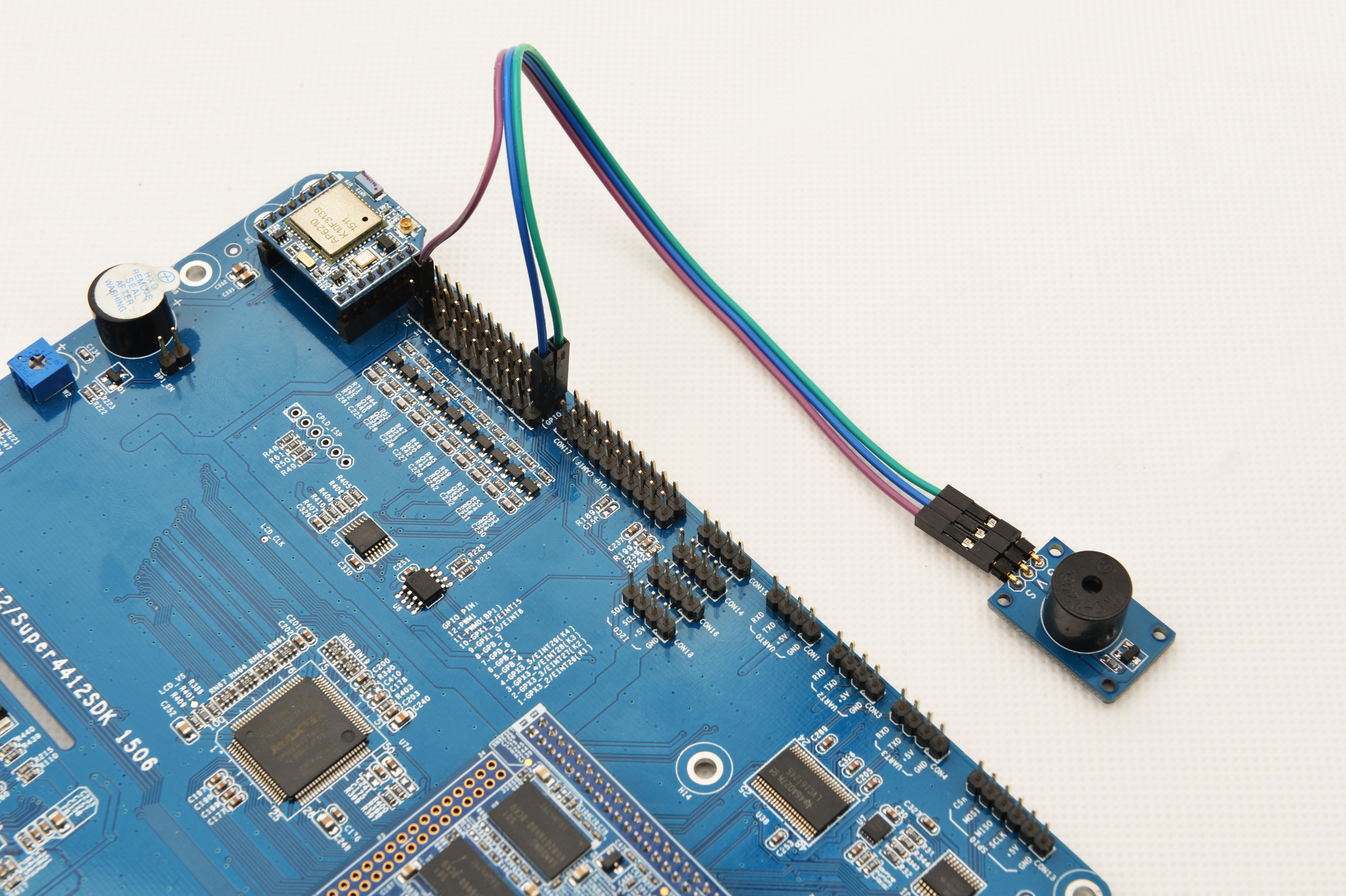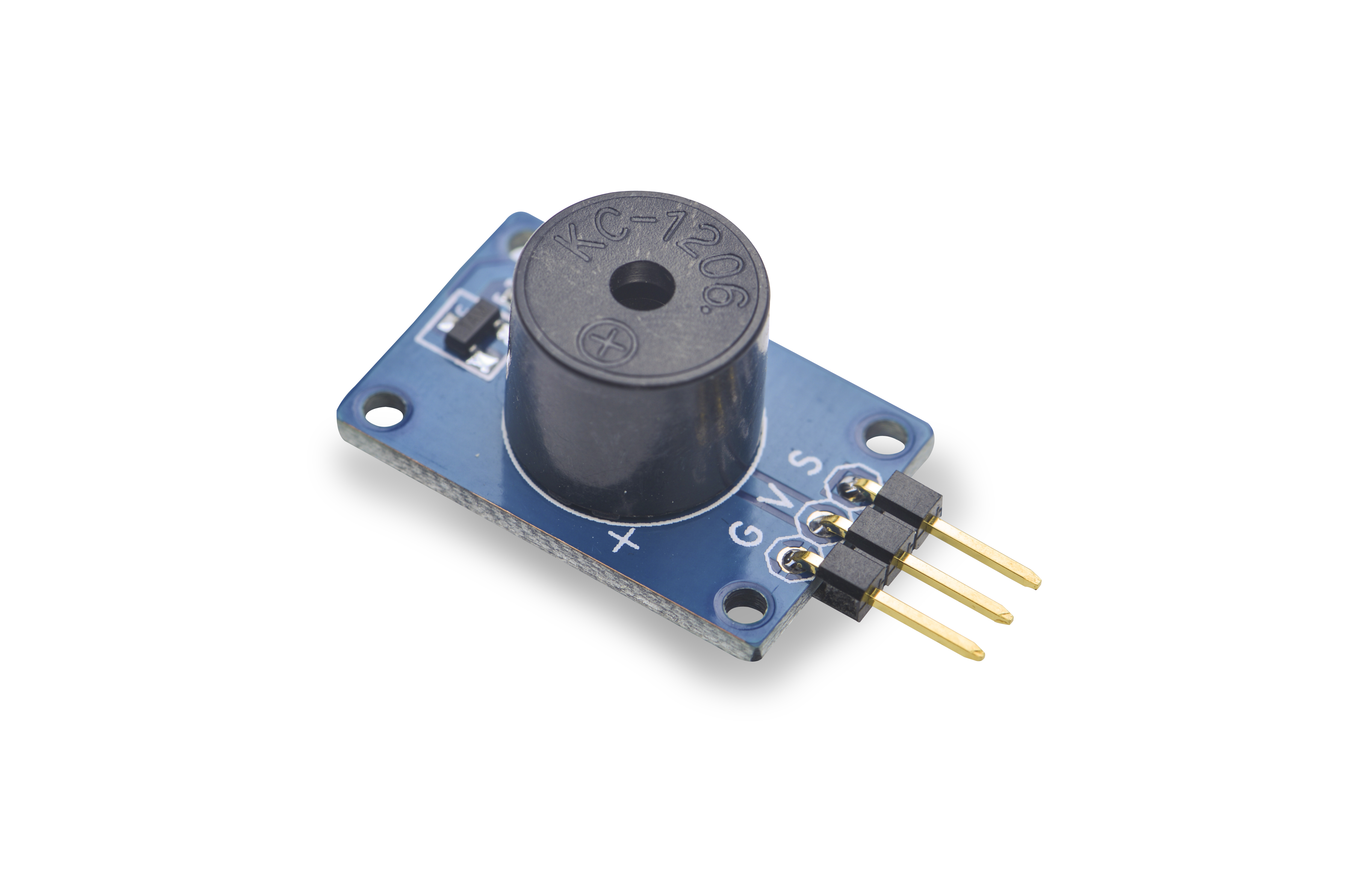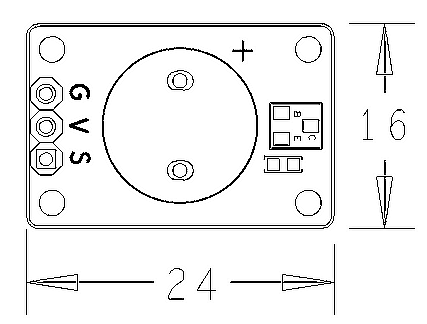Difference between revisions of "Matrix - Buzzer"
(→下载Matrix源码) |
(→与NanoPi连接使用) |
||
| Line 45: | Line 45: | ||
If this is successful a "matrix" directory will be generated, which will contain all the matrix modules' code samples. | If this is successful a "matrix" directory will be generated, which will contain all the matrix modules' code samples. | ||
| − | == | + | ==Connect to NanoPi== |
| − | === | + | ===Preparations=== |
| − | + | Please install a Debian on a NanoPi and an appropriate cross compiler on a PC. Please refer to wiki: [[NanoPi/zh|NanoPi]] <br> | |
| − | + | Compile a NanoPi kernel. Note: please use the kernel's source code from the nanopi-v4.1.y-matrix branch.<br> | |
| − | + | ||
<syntaxhighlight lang="bash"> | <syntaxhighlight lang="bash"> | ||
$ git clone https://github.com/friendlyarm/linux-4.x.y.git | $ git clone https://github.com/friendlyarm/linux-4.x.y.git | ||
| Line 59: | Line 58: | ||
</syntaxhighlight> | </syntaxhighlight> | ||
| − | === | + | ===Hardware Connection=== |
| − | + | Please refer to the following connection diagram to connect the Matrix-Buzzer to the NanoPi <br> | |
[[File:matrix-buzzer_nanopi.jpg|frameless|600px|matrix-buzzer_nanopi]] | [[File:matrix-buzzer_nanopi.jpg|frameless|600px|matrix-buzzer_nanopi]] | ||
| − | + | Connection Details: | |
{| class="wikitable" | {| class="wikitable" | ||
|- | |- | ||
| Line 75: | Line 74: | ||
|} | |} | ||
| − | === | + | ===Compile Test Program=== |
| − | + | Please login the matrix hub and enter the nanopi branch | |
<syntaxhighlight lang="bash"> | <syntaxhighlight lang="bash"> | ||
$ cd matrix | $ cd matrix | ||
| Line 82: | Line 81: | ||
</syntaxhighlight> | </syntaxhighlight> | ||
| − | + | Compile the matrix code | |
<syntaxhighlight lang="bash"> | <syntaxhighlight lang="bash"> | ||
$ make CROSS_COMPILE=arm-linux- clean | $ make CROSS_COMPILE=arm-linux- clean | ||
| Line 88: | Line 87: | ||
$ make CROSS_COMPILE=arm-linux- install | $ make CROSS_COMPILE=arm-linux- install | ||
</syntaxhighlight> | </syntaxhighlight> | ||
| − | + | Note: please make sure to install the cross compiler "arm-linux-gcc-4.4.3" on your PC, which is used to compile files for the NanoPi-Debian.<br> | |
| − | + | Generated library files are under the "install/lib" directory. Applications are under the "install/usr/bin" directory. The test program for the "Matrix-Buzzer" module is "matrix-buzzer".<br> | |
| − | === | + | ===Run Test Program=== |
| − | + | Please copy the library files and test program to the NanoPi | |
<syntaxhighlight lang="bash"> | <syntaxhighlight lang="bash"> | ||
$ cp install/usr/bin/* nanopi_rootfs/usr/bin/ | $ cp install/usr/bin/* nanopi_rootfs/usr/bin/ | ||
| Line 98: | Line 97: | ||
</syntaxhighlight> | </syntaxhighlight> | ||
| − | + | Power on the NanoPi and run the following command in Debian's terminal <br> | |
<syntaxhighlight lang="bash"> | <syntaxhighlight lang="bash"> | ||
$ matrix-buzzer | $ matrix-buzzer | ||
</syntaxhighlight> | </syntaxhighlight> | ||
| − | === | + | ===Code Sample=== |
<syntaxhighlight lang="c"> | <syntaxhighlight lang="c"> | ||
int main(int argc, char ** argv) | int main(int argc, char ** argv) | ||
Revision as of 10:35, 25 September 2015
Contents
1 Introduction
- The Matrix-Buzzer is a passive buzzer. To drive this buzzer an oscillating source generating 2K - 5K square waves is needed.
- It can be used in electronic devices that need sound generators.
2 Features
- 3 PIN interface
- PCB dimension (mm): 16 x 24
- Pin Description:
| Pin | Description |
| V | Supply Voltage 5V |
| G | Ground |
| S | PWM Input |
3 Basic Device Operation
A passive buzzer will not tweet if DC signals are used; instead, you need to use square waves whose frequency is between 2K and 5K to drive it. If you use GPIO signals to drive it you need to pull the GPIO high first and then low to generate oscillation. The oscillation frequency is generated by the time in which GPIO signals turn from high to low. The buzzer will generate different sounds based on different frequencies.
4 Download Matrix Source Code
All the matrix modules' code samples are open source. They are maintained on GitHub - git://github.com/friendlyarm/matrix.git
Each branch in this hub contains the matrix modules' code samples for a board that the matrix modules can work with.
- The nanopi branch contains the matrix modules' code samples for the NanoPi
- The tiny4412 branch contains the matrix modules' code samples for the Tiny4412
- The raspberrypi branch contains the matrix modules' code samples for the RaspberryPi
Please follow the steps below to get the source code:
Install the git utility on a PC running Ubuntu14.04
$ sudo apt-get install git
Clone the matrix code from GitHub
$ git clone git://github.com/friendlyarm/matrix.git
If this is successful a "matrix" directory will be generated, which will contain all the matrix modules' code samples.
5 Connect to NanoPi
5.1 Preparations
Please install a Debian on a NanoPi and an appropriate cross compiler on a PC. Please refer to wiki: NanoPi
Compile a NanoPi kernel. Note: please use the kernel's source code from the nanopi-v4.1.y-matrix branch.
$ git clone https://github.com/friendlyarm/linux-4.x.y.git $ cd linux-4.x.y $ git checkout nanopi-v4.1.y-matrix $ make nanopi_defconfig $ touch .scmversion $ make
5.2 Hardware Connection
Please refer to the following connection diagram to connect the Matrix-Buzzer to the NanoPi

Connection Details:
| Matrix-Buzzer | NanoPi |
| G | Pin6 |
| V | Pin4 |
| S | Pin22 |
5.3 Compile Test Program
Please login the matrix hub and enter the nanopi branch
$ cd matrix $ git checkout nanopi
Compile the matrix code
$ make CROSS_COMPILE=arm-linux- clean $ make CROSS_COMPILE=arm-linux- $ make CROSS_COMPILE=arm-linux- install
Note: please make sure to install the cross compiler "arm-linux-gcc-4.4.3" on your PC, which is used to compile files for the NanoPi-Debian.
Generated library files are under the "install/lib" directory. Applications are under the "install/usr/bin" directory. The test program for the "Matrix-Buzzer" module is "matrix-buzzer".
5.4 Run Test Program
Please copy the library files and test program to the NanoPi
$ cp install/usr/bin/* nanopi_rootfs/usr/bin/ $ cp install/lib/* nanopi_rootfs/lib/ -d
Power on the NanoPi and run the following command in Debian's terminal
$ matrix-buzzer5.5 Code Sample
int main(int argc, char ** argv) { int pin = PWM_PIN1; int Hz; int duty; if (argc == 4) { if (parseCmd(argc, argv, &pin, &Hz, &duty) == -1) { return -1; } } else { Hz = 1000; duty = 500; printf("Usage:%s PWM[0~1] freq duty[0~1000]\n", argv[0]); printf("Using default config: pin=PWM0 freq=%dHz duty=%d\n", Hz, duty); } if (PWMPlay(pin, Hz, duty) == -1) { printf("Fail to output PWM\n"); } printf("Press enter to stop PWM\n"); getchar(); PWMStop(pin); printf("Stopped PWM\n"); return 0; }
6 与Tiny4412连接使用
6.1 准备工作
参考Tiny4412光盘里的《友善之臂Ubuntu使用手册》,在Tiny4412上运行UbuntuCore系统,然后在主机PC上安装并使用相应的编译器。
注意:只能使用Tiny4412SDK-1506的底板。
6.2 硬件连接
参考下图连接模块Matrix-Buzzer和Tiny4412

连接说明:
| Matrix-Buzzer | Tiny4412 |
| G | GPIO1 GND |
| V | GPIO1 5V |
| S | GPIO11 S |
6.3 编译测试程序
进入Matrix代码仓库,切换到tiny4412分支
$ cd matrix $ git checkout tiny4412
编译Matrix配件代码
$ make CROSS_COMPILE=arm-linux-gnueabihf- clean $ make CROSS_COMPILE=arm-linux-gnueabihf- $ make CROSS_COMPILE=arm-linux-gnueabihf- install
注意:请确保你的主机PC当前使用的交叉编译器为Tiny4412-UbuntuCore配套的arm-linux-gnueabihf-gcc-4.7.3。
编译出来的库文件位于install/lib目录下,而测试程序则位于install/usr/bin目录下,模块Matrix-Buzzer对应的测试程序为matrix-buzzer。
6.4 运行测试程序
拷贝库文件和测试程序到Tiny4412的UbuntuCore的文件系统上
$ cp install/usr/bin/* tiny4412_rootfs/usr/bin/ $ cp install/lib/* tiny4412_rootfs/lib/ -d
然后启动Tiny4412,在UbuntuCore的shell终端中执行如下命令运行模块Matrix-Buzzer的测试程序
$ matrix-buzzer6.5 代码展示
int main(int argc, char ** argv) { int pin = PWM_PIN1; int Hz; int duty; if (argc == 4) { if (parseCmd(argc, argv, &pin, &Hz, &duty) == -1) { return -1; } } else { Hz = 1000; duty = 500; printf("Usage:%s PWM[0~1] freq duty[0~1000]\n", argv[0]); printf("Using default config: pin=PWM0 freq=%dHz duty=%d\n", Hz, duty); } if (PWMPlay(pin, Hz, duty) == -1) { printf("Fail to output PWM\n"); } printf("Press enter to stop PWM\n"); getchar(); PWMStop(pin); printf("Stopped PWM\n"); return 0; }

